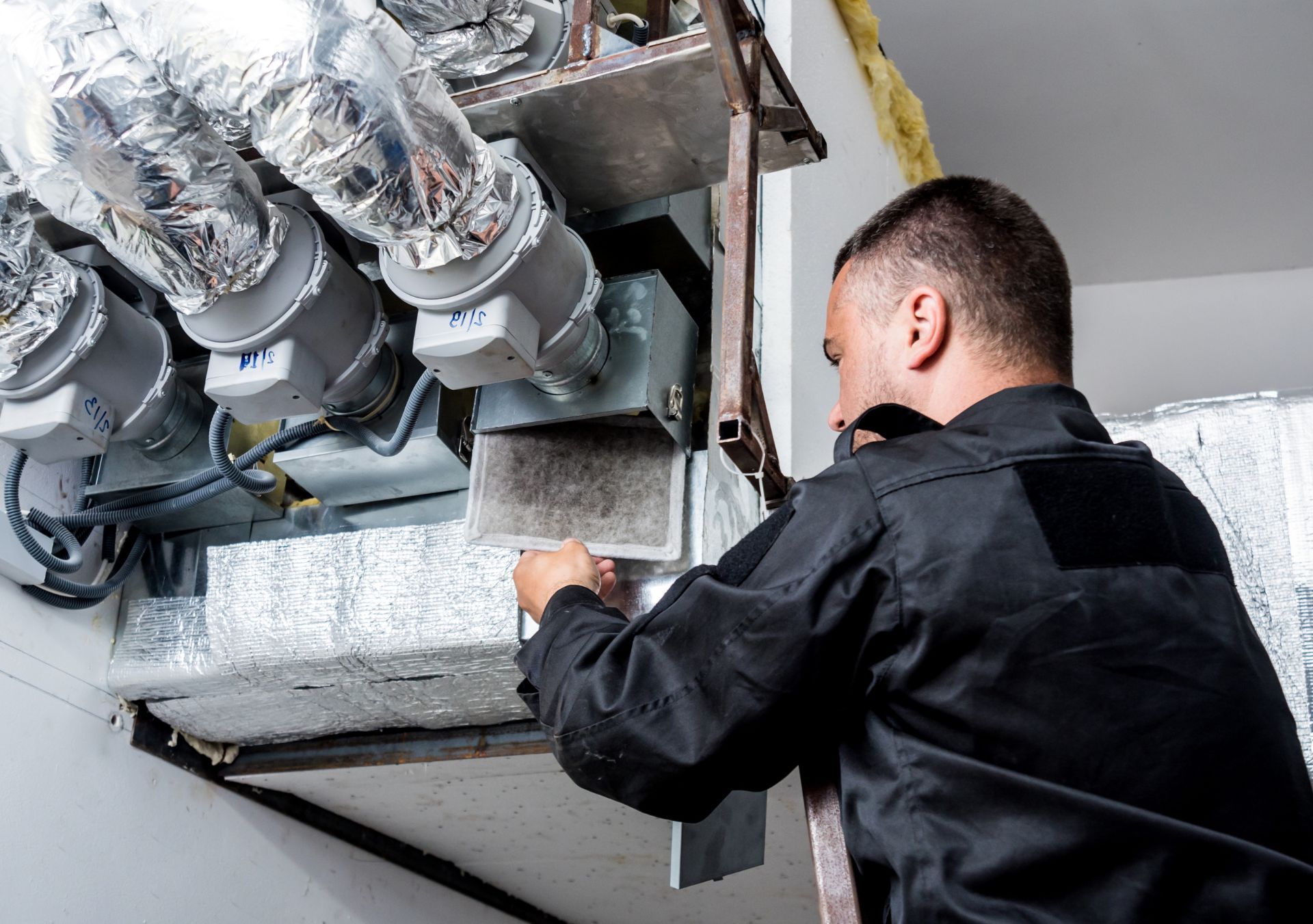New York HVAC Contractor Insurance
See How We're Different:
or Call Us: 212-425-8150

Most Common Business Policies
Index
Understanding the Basics of HVAC Contractor Insuranc
Types of Coverage for HVAC Contractors in New York
How to Choose the Right HVAC Contractor Insurance in New York
Cost of HVAC Contractor Insurance in New York
Legal Requirements for HVAC Contractor Insurance in New York
Claiming HVAC Contractor Insurance in New York
Frequently Asked Questions about New York HVAC Contractor Insurance
Contact Us
Running an HVAC (Heating, Ventilation, and Air Conditioning) business in New York City comes with its own set of challenges and risks. One of the most critical aspects of protecting your business is securing the right insurance coverage. This article will guide you through everything you need to know about HVAC contractor insurance in New York, covering its importance, types of coverage, how to choose the right policy, costs involved, legal requirements, and claiming processes.
Understanding the Basics of HVAC Contractor Insurance
HVAC contractor insurance is designed to protect your business from various risks associated with the HVAC industry. This insurance not only safeguards the financial assets of your company but also enhances your reputation among clients and helps in maintaining compliance with state laws.
Importance of HVAC Contractor Insurance
The importance of HVAC contractor insurance cannot be overstated. It provides a safety net for your business against lawsuits, property damage, worker injuries, and unforeseen circumstances. Without proper insurance, HVAC contractors might face enormous financial burdens that could threaten the viability of their business.
Moreover, many clients prefer hiring contractors who have insurance coverage. It shows professionalism and instills confidence in the services being offered. In an industry where accidents can happen at any time, having this protection is crucial. For instance, if a technician accidentally damages a client's property while performing maintenance, having insurance can cover the repair costs and prevent potential legal issues. This not only protects your financial interests but also helps maintain a positive relationship with your clients, ensuring they feel secure in their decision to hire you.
Key Terms in HVAC Contractor Insurance
To understand HVAC contractor insurance thoroughly, it is essential to familiarize yourself with key terms. Some of these include:
- Premium: The amount you pay for your insurance policy.
- Deductible: The amount you agree to pay out-of-pocket before your insurance kicks in.
- Coverage Limit: The maximum amount your insurer will pay for a covered loss.
- Exclusions: Specific situations or circumstances that are not covered by your insurance policy.
Understanding these terms will help you navigate the policies available and choose the right one for your needs. Additionally, it’s important to recognize that different types of HVAC contractor insurance may be necessary depending on the specific services you offer. For example, general liability insurance is essential for protecting against third-party claims, while workers' compensation insurance is vital for covering employee injuries on the job. As your business grows and evolves, so too should your insurance coverage, ensuring that you are adequately protected against the unique risks that come with your expanding operations.

Types of Coverage for HVAC Contractors in New York
Several types of insurance coverage are pertinent for HVAC contractors operating in New York. Each serves a unique purpose and addresses different risks that contractors may face while conducting their business.
General Liability Insurance
General liability insurance is a fundamental coverage type for HVAC contractors. It protects against third-party claims relating to bodily injury, property damage, and personal injury occurring on your job sites. For instance, if a customer is injured during an installation or if your work accidentally causes damage to a client's property, this insurance will cover those claims. Additionally, it can also provide coverage for legal fees and settlements if you are sued, which can be a significant financial burden for small businesses. This type of insurance not only safeguards your finances but also enhances your professional reputation, as clients are more likely to hire contractors who are adequately insured.
Workers Compensation Insurance
Workers compensation insurance is required by law in New York if you have employees. This insurance covers medical expenses and lost wages for employees who are injured on the job. Given that HVAC work often involves manual labor and potential hazards, having this safety net is vital for both your workers and your business. Moreover, maintaining a robust workers compensation policy can help foster a positive work environment, as employees feel more secure knowing they are protected in case of an accident. In the long run, this can lead to improved morale and productivity, reducing turnover and the associated costs of hiring and training new staff.
Commercial Auto Insurance
If your HVAC business uses vehicles for transporting equipment and employees, commercial auto insurance is necessary. This insurance covers damages to your vehicles as well as liability in the event of an accident. Adequate coverage can help protect your assets and ensure that your operations are not disrupted by vehicle-related incidents. Additionally, commercial auto insurance can extend to cover the tools and equipment that are stored in your vehicles, which is crucial for HVAC contractors who rely on specialized gear to perform their jobs. By investing in comprehensive commercial auto insurance, you can mitigate the financial risks associated with vehicle accidents and ensure that your business remains operational, even in the face of unforeseen challenges.
How to Choose the Right HVAC Contractor Insurance in New York
Choosing the right insurance for your HVAC business involves careful evaluation of your specific needs, risks, and available options. Here are some steps you should follow:
Assessing Your Business Risks
Start by assessing the unique risks associated with your HVAC business. Consider aspects like the size of your projects, the number of employees, and the types of services you offer. Identifying potential risks allows you to determine the levels of coverage necessary to protect your business effectively. For instance, if your team frequently works on large commercial projects, you may face higher liability risks compared to smaller residential jobs. Additionally, consider the potential for equipment breakdowns, which could lead to costly downtimes and repairs, further emphasizing the need for comprehensive coverage.
Comparing Insurance Providers
Not all insurance companies are the same. It is important to compare multiple providers and their offerings. Look at customer reviews, ask for recommendations from peers, and check their financial stability. A provider with a strong reputation and solid financial backing can offer peace of mind, knowing they will be there when you need them most.
Request quotes from different insurers to get a clearer picture of pricing and policy options. This comparison will help you find the best fit for your business needs and budget. Additionally, inquire about any discounts available for bundling policies or for maintaining a good safety record, as these can significantly reduce your overall costs.
Evaluating Policy Terms and Conditions
Once you've narrowed down your options, take the time to carefully read the terms and conditions of each policy. Pay attention to the coverage limits, exclusions, and deductibles. Understanding the fine print is crucial to avoid surprises during the claim process. For example, some policies may exclude coverage for certain types of equipment or specific circumstances, such as natural disasters, which could leave your business vulnerable.
Furthermore, consider the claims process itself. A streamlined and responsive claims process can make a significant difference in how quickly you can recover from an incident. Look for insurers that offer 24/7 claims reporting and support, as this can be invaluable in times of crisis. Additionally, ask about the insurer's history of handling claims for HVAC contractors specifically, as this can provide insight into their expertise and reliability in your industry.
Cost of HVAC Contractor Insurance in New York
The cost of insurance for HVAC contractors in New York can vary widely based on several factors. Understanding these variables can help you budget accordingly.
Factors Influencing Insurance Premiums
Several factors impact insurance premiums, including:
- Your business's annual revenue
- The number of employees
- Your claims history
- The types of services provided
- The coverage options selected
Being aware of these factors can help you make informed decisions about your insurance coverage and manage costs effectively. For instance, a contractor who specializes in high-risk installations may face higher premiums compared to one who focuses on routine maintenance. Additionally, the geographical area in which you operate can also play a significant role; urban areas may have different risk assessments compared to rural locations, affecting the overall cost of your insurance.
Ways to Lower Your Insurance Costs
There are various strategies you can employ to lower your insurance premiums. Consider bundling different coverages with the same insurer for a discounted rate. Additionally, maintaining a good claims history and implementing safety measures in your business can have a positive impact on your premiums. Investing in training for your employees on safety protocols not only reduces the likelihood of accidents but also demonstrates to insurers that you are proactive about risk management.
Regularly reviewing your policies and comparing quotes can also help you stay competitive in your coverage costs. It’s beneficial to engage with an insurance broker who specializes in contractor insurance; they can provide insights into the best policies available and help you navigate the complexities of coverage options. Furthermore, participating in industry associations may offer access to group insurance plans, which can lead to significant savings. By staying informed and proactive, you can effectively manage your insurance expenses while ensuring that your business remains protected.
Legal Requirements for HVAC Contractor Insurance in New York
Understanding the legal landscape regarding insurance in New York is crucial for HVAC contractors. Compliance with state regulations can help you avoid penalties and business interruptions.
State Insurance Regulations
The state of New York mandates certain requirements for HVAC contractors regarding insurance. This includes having workers' compensation insurance if you have employees, as well as general liability insurance to protect against potential claims. Additionally, many contractors opt for commercial auto insurance, especially if they use vehicles for transporting equipment or employees. Being aware of these regulations is essential to operate legally and ethically.
Moreover, HVAC contractors should also consider obtaining professional liability insurance, which can cover claims related to negligence or failure to deliver services as promised. This type of insurance is particularly important in an industry where precision and adherence to safety standards are paramount. Understanding the nuances of these various insurance types can not only safeguard your business but also enhance your credibility with clients who seek assurance of your professionalism and reliability.
Penalties for Non-Compliance
Failure to comply with state insurance regulations can lead to serious repercussions. Penalties may include fines, legal action, and the potential suspension of your business operations. Not only does non-compliance pose financial risks, but it can also damage your reputation within the industry. In some cases, contractors may find it challenging to secure future contracts or partnerships if they have a history of regulatory violations.
Furthermore, the impact of non-compliance can extend beyond immediate financial penalties. It can lead to increased scrutiny from regulatory bodies and insurance companies, making it more difficult to obtain necessary coverage in the future. Clients may also be wary of hiring contractors who do not adhere to legal requirements, fearing potential liabilities that could arise from hiring an uninsured or underinsured contractor. Therefore, maintaining compliance is not just a legal obligation but a crucial aspect of building trust and credibility in the competitive HVAC market.
Claiming HVAC Contractor Insurance in New York
In the unfortunate event that you need to file a claim, knowing the processes beforehand can save you time and headaches.
When to File a Claim
Claims can arise from various incidents, such as property damage, worker injuries, or theft. Generally, you should file a claim as soon as possible after the incident occurs. Delaying the filing process may complicate matters and may even affect your entitlement to coverage. It's important to be aware of your policy's specific time limits for filing claims, as these can vary significantly between different insurance providers and types of coverage.
The Claim Process Explained
The claim process typically involves several steps:
- Notify your insurance provider of the incident.
- Complete any necessary claim forms.
- Provide documentation and evidence supporting your claim.
- Collaborate with your insurance adjuster during their investigation.
Following these steps will help you navigate the claims process efficiently and increase your chances of a successful outcome. Additionally, maintaining detailed records of all communications with your insurance company can be beneficial. This includes notes from phone calls, copies of emails, and any correspondence regarding the claim. Such documentation can serve as a valuable reference should any disputes arise during the claims process.
Furthermore, it’s advisable to take photographs of any damages or incidents as soon as they occur. Visual evidence can significantly bolster your claim, providing clear proof of the situation at hand. If the incident involves worker injuries, ensure that you also document the circumstances surrounding the event, including witness statements if possible. This comprehensive approach not only strengthens your claim but also demonstrates your commitment to transparency and thoroughness in handling the situation.

Frequently Asked Questions about New York HVAC Contractor Insurance
Many HVAC contractors have questions regarding their insurance needs. Here are some common inquiries.
Can I Operate Without Insurance?
While it may be possible to operate without insurance, it is highly inadvisable. Operating without coverage exposes you to significant risks that could result in financial ruin, especially in an industry as unpredictable as HVAC. Additionally, legal requirements often mandate specific coverages. In New York, for instance, contractors are typically required to carry liability insurance to protect against potential claims from clients or third parties. Without this coverage, you could face lawsuits that not only threaten your business's financial stability but also your personal assets.
What Does My Insurance Cover?
Your insurance policy will typically cover various incidents based on the types of coverage you select. Common coverages include protection against property damage, bodily injury claims, workers' compensation for employee injuries, and more. Always consult your policy details to understand what is included and what may be excluded. Additionally, specialized coverages such as equipment breakdown insurance can be crucial for HVAC contractors, as it protects against the costs associated with repairing or replacing essential tools and machinery that may fail during operations.
How Often Should I Review My Insurance Policy?
It is advisable to review your insurance policy at least annually or whenever there are significant changes to your business. This includes changes in the number of employees, variations in service offerings, or shifts in your business's financial status. Regular reviews ensure that your coverage remains adequate and aligned with your evolving business needs. Furthermore, as your business grows, you may find opportunities to bundle policies or negotiate better rates, which can lead to substantial savings over time.
Understanding the nuances of HVAC contractor insurance is pivotal for any contractor operating in New York. Each policy can vary significantly based on the insurer and the specific risks associated with your operations. For instance, if you frequently work on commercial projects, you may need higher liability limits compared to residential jobs. By educating yourself about the necessary coverages, costs, legal regulations, and processes, you can safeguard your business against unexpected challenges and focus on providing quality HVAC services to your clients. Staying informed also allows you to adapt to changes in the industry, such as new regulations or emerging technologies, ensuring that your business remains competitive and compliant.
